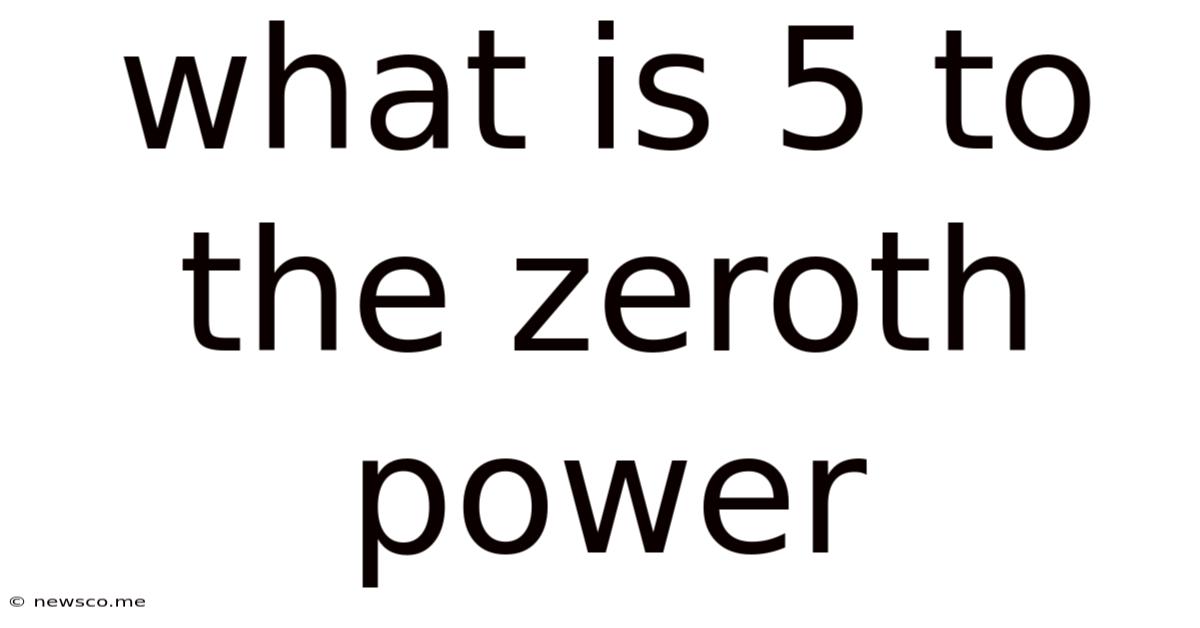What Is 5 To The Zeroth Power
News Co
Mar 27, 2025 · 5 min read

Table of Contents
What is 5 to the Zeroth Power? Unraveling the Mystery of Exponents
Understanding exponents is fundamental to mathematics, underpinning various concepts from algebra to calculus. One particularly intriguing aspect of exponents involves raising a number to the power of zero. This often leads to confusion: what does it mean to raise a number, like 5, to the zeroth power (5⁰)? This comprehensive guide will delve into the intricacies of this mathematical concept, explaining not just the answer but also the underlying logic and its implications.
Understanding Exponents: A Quick Refresher
Before tackling the zero exponent, let's solidify our understanding of exponents themselves. An exponent, also known as a power or index, indicates how many times a number (the base) is multiplied by itself. For example:
- 5² (5 to the power of 2, or 5 squared) means 5 × 5 = 25
- 5³ (5 to the power of 3, or 5 cubed) means 5 × 5 × 5 = 125
- 5⁴ (5 to the power of 4) means 5 × 5 × 5 × 5 = 625
Notice a pattern? As we increase the exponent, we multiply the base by itself one more time. This consistent pattern is crucial in understanding the rule for zero exponents.
The Rule of Zero Exponents: Why 5⁰ = 1
The seemingly counterintuitive result, that any non-zero number raised to the power of zero equals 1 (e.g., 5⁰ = 1), stems from maintaining the consistency of the pattern observed in positive exponents. Let's examine this consistency through a few different approaches:
1. The Pattern Approach: Dividing Exponents
Consider the following sequence:
5⁴ = 625 5³ = 125 5² = 25 5¹ = 5
Notice that as the exponent decreases by 1, the result is divided by the base (5). Following this pattern logically, to find 5⁰, we would divide 5¹ by 5:
5¹ / 5 = 1
This reinforces the rule that 5⁰ = 1.
2. The Identity Property of Multiplication
In mathematics, the identity property of multiplication states that any number multiplied by 1 remains unchanged. This property provides another perspective on why 5⁰ equals 1. Consider the following:
5³ / 5³ = 1 (Any number divided by itself equals 1)
Using the rules of exponents (subtracting exponents when dividing with the same base), we can rewrite this as:
5⁽³⁻³⁾ = 1 5⁰ = 1
This demonstrates that maintaining the consistency of exponential rules necessitates 5⁰ equaling 1.
3. The Empty Product
A less commonly used but conceptually insightful approach is to consider the concept of an "empty product". In multiplication, the empty product, equivalent to multiplying no numbers at all, results in 1. This aligns with the convention for zero exponents. When we have 5³, we're multiplying 5 by itself three times; 5⁰ represents multiplying 5 by itself zero times, leading to the empty product and the result of 1.
Addressing Common Misconceptions
Several common misunderstandings arise when dealing with zero exponents. Let's address some of these:
1. "Zero to the Zeroth Power is Undefined"
This is partially true. While x⁰ = 1 for any non-zero x, the expression 0⁰ is undefined. This is because there's no consistent pattern or logical explanation that can be applied in this particular case, leading to contradictory results based on different mathematical approaches. It's important to distinguish this special case from other zero exponent instances.
2. "Any Number to the Zeroth Power is Zero"
This is incorrect. Only 0⁰ is undefined, whereas any non-zero number raised to the power of zero is always equal to 1.
Beyond 5⁰: Applications and Importance of Zero Exponents
Understanding zero exponents is not merely an academic exercise; it has practical applications across various areas of mathematics and beyond.
1. Simplifying Algebraic Expressions
Zero exponents often appear in algebraic simplification. They allow us to condense expressions and eliminate terms, making calculations easier and more manageable. For example, simplifying expressions containing variables raised to different powers becomes much more straightforward with a firm grasp of zero exponents.
2. Polynomial Expansions
In algebra and calculus, particularly when working with Taylor series and Maclaurin series (representations of functions as infinite sums of terms), the concept of zero exponents plays a critical role in expressing and manipulating the series correctly.
3. Combinatorics and Probability
In combinatorics and probability calculations, expressions involving factorials (e.g., n!) often lead to the use of zero exponents for simplification and generalization of certain formulas.
4. Computer Science and Programming
In computer science and programming, understanding zero exponents is necessary for handling numerical calculations, particularly in implementing algorithms and data structures related to exponential growth or decay.
Conclusion: Mastering the Zero Exponent
The concept of raising a number to the zeroth power might seem initially confusing, but by understanding the underlying logic and applying the established mathematical rules, we can see that it's a consistent and vital part of the larger mathematical framework. The rule that 5⁰ = 1, and more generally, x⁰ = 1 (for x ≠ 0), isn't an arbitrary rule; it is a consequence of maintaining the logical consistency of exponential operations. Grasping this concept strengthens our understanding of exponents, paving the way for tackling more complex mathematical concepts in algebra, calculus, and beyond. Remember the pattern, consider the division approach, or explore the concept of the empty product – whatever resonates with you, understanding the rationale behind 5⁰ = 1 will significantly enhance your mathematical abilities. It's a cornerstone principle with widespread applications, demonstrating the elegance and interconnectedness of mathematical rules.
Latest Posts
Related Post
Thank you for visiting our website which covers about What Is 5 To The Zeroth Power . We hope the information provided has been useful to you. Feel free to contact us if you have any questions or need further assistance. See you next time and don't miss to bookmark.